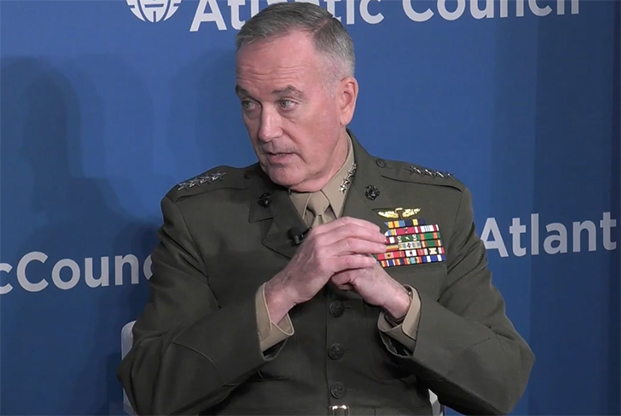
Chairman of the Joint Chiefs of Staff Gen. Joseph Dunford speaks Thursday at an Atlantic Council event in Washington, D.C. YouTube screenshot.
As Russia continues its information and cyber warfare operations on the continent, the United States is ramping up its presence in the region, the top US uniformed official said Thursday.
Chairman of the Joint Chiefs of Staff Gen. Joseph Dunford, speaking at the Atlantic Council in Washington, D.C., said Russia is a “competitor” to the US in Europe, not an adversary, though it has increased its cyber operations to undermine democracy in Europe and in the US, as evidenced by Russian meddling in the 2016 election.
“Russia is an autocratic form of government,” Dunford said. “I make the assumption there is very little Russia does that Putin is not aware of.”
In response to the increasing Russian belligerence, the US has deployed more forces, built up more infrastructure, and increased its training with allies in Europe. In past years, the US military has increased its funding for the European Deterrence Initiative to pay for the buildup, though the 2020 budget request reduces that funding for the first time since it was introduced in 2014.
“It wouldn’t be a bold statement to say Russia would be much more comfortable if we weren’t physically present in Europe,” Dunford said.
While Russia cannot stop the US from working closely with allies, there is “absolutely no question” they can contest American operations, he said.
Despite the increased tension, the two countries have gotten better at deconflicting operations. About 18 months ago, there was a “spike” in unprofessional intercepts of aircraft and ships in the region, said Dunford. Through deconfliction channels, such as the phone line between US and Russian operations centers in the Middle East, these incidents have been reduced.
Dunford visited the think tank to discuss the Pentagon’s National Defense Strategy, and its focus on competition with great powers such as Russia and China. With China, the US has seen that country rapidly innovate and build up its military focusing on long-range missiles, maritime assets, and long-range aircraft. China is reinventing and modernizing its military in a way similar to the US in the 1980s, specifically under the Goldwater-Nichols Act, Dunford said.
The country is building bases throughout the world, in places such as Africa, which show “clear aspirations well beyond the Pacific,” he said.
“They have intentions today of challenging the US military’s ability to project power in the Pacific and meet our alliance commitments,” Dunford said.
Last week, Dunford made news at a Senate Armed Services Committee hearing by blasting Google for working with China while the company refuses to work with the US military. He said Thursday there are “second and third order effects” for US businesses working in China, especially when it comes to innovations being introduced to the Chinese military. For example, Google recently opened an artificial intelligence center in China that will be of interest to the military there, he said.
“US companies assisting the Chinese military in advancing technologically is not in the US interests,” he said, adding that he was meeting with Google later Thursday to discuss the issue.